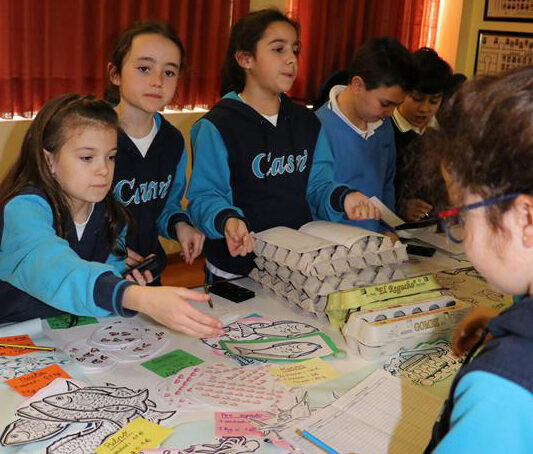Financial education is an essential skill that, when introduced from an early age, can have a significant impact on our children’s lives. While it may seem premature to talk about basic financial education with children so young, it is never too early to start instilling good financial habits, both at home and in their school environment.
ARE YOUR CHILDREN PREPARED TO HANDLE MONEY IN THE FUTURE?
In a world where financial decisions play an increasingly important role in everyday life, there is a concern that many parents share. How can I ensure that my children have a good relationship with money from a young age? Most adults face financial problems due to a lack of financial education. This can lead to debt, poor savings management and risky investments. So how can we prevent our children from repeating these mistakes?
If not taught early, children may grow up without understanding the value of money, financial responsibilities and how to make economic decisions. intelligent. This puts them at a disadvantage in meeting the challenges of the future.

WHY IS FINANCIAL EDUCATION IMPORTANT FROM AN EARLY AGE?

Imagine your children reaching adolescence without a solid foundation of financial education. They won’t know how to save, how to avoid unnecessary debt or how to manage the money they earn. The impact can be devastating: adults in debt, without savings and without the ability to plan financially for their future.
The reality is that financial literacy is one of the most underestimated skills in parenting, despite being essential for adult life. According to studies by the Organisation for Economic Co-operation and Development (OECD), only 30% of adults worldwide understand basic financial concepts. Worst of all, this problem starts in childhood. Without proper financial literacy, future generations will be trapped in cycles of poor economic decisions.
BENEFITS OF EARLY FINANCIAL EDUCATION
- Development of decision-making skills: Children who learn about finances from a young age develop better skills to make informed decisions.
- Debt prevention: Good financial education can help prevent debt problems in the future.
- Encouraging savings: Teaching children to save from an early age instils in them the habit of setting aside a portion of their income for the future.
- Understanding the value of money: Children learn that money is not infinite and must be handled with care.
"Only 30% of adults globally understand basic financial concepts".

SOLUTION: INTRODUCING FINANCIAL EDUCATION FROM SCRATCH AT HOME
The good news is that you can start to solve this problem, today, from home. Introducing financial literacy concepts for beginners into your children’s lives is not only possible, it’s easier than you might think.
HOW TO IMPROVE FINANCIAL EDUCATION?
Here are practical strategies for instilling good financial habits in your little ones:
1. MAKE MONEY PART OF THE FAMILY CONVERSATION
The first step to improving financial education is to create an environment where money is not a taboo subject. Talk openly about how money works, where it comes from and how it is spent. Be sure to explain that money is not infinite and that it takes effort to obtain it. This will help your children understand that money has value.
2. GAMES AND PRACTICAL ACTIVITIES
Children learn best by playing. Use games to teach them key concepts:
- Play Shop: Simulates a shop at home where children can use pretend money to buy products. This helps them understand the value of goods and how they are exchanged.
- Monopoly and other financial board games: These games are excellent for teaching the importance of saving, investing and planning.
- Educational applications: There are applications such as “PiggyBot” and “iAllowance” that introduce children to the world of saving and money management in an interactive way.
3. ENCOURAGING SAVINGS FROM A YOUNG AGE
Teaching the savings habit from an early age is crucial for basic financial literacy. Give your children a piggy bank and encourage them to save some or all of any money they receive. You can incentivise them by creating savings goals. This is the case of collecting money for a toy they want. This process will teach them to be patient and appreciate what they have.
4. USE REAL EXAMPLES AT HOME
Children learn by watching. Be a good role model for your financial habits. Show how you make a family budget. Compare prices before making major purchases and explain the importance of spending only what is necessary. This will help them internalise good financial behaviours.
5. SEIZE EVERYDAY OPPORTUNITIES
Involve your children in simple decisions involving money. For example, choosing which product to buy at the supermarket. Explain the difference between more expensive and cheaper products. Also the importance of evaluating needs versus wants.
6. EDUCATING ABOUT THE VALUE OF WORK
A fundamental lesson in financial education is to teach that money is earned by working. Assign small tasks or responsibilities at home and offer them a small monetary reward. This will help them to understand the relationship between effort and reward, and to value more what they get.

CASVI VILLAVICIOSA, AN EXAMPLE OF THE INTEGRATION OF FINANCIAL EDUCATION IN SCHOOL EDUCATION
An excellent example of how financial education can be integrated into school education from an early age is the model implemented by the Eurocolegio Casvi International Private School in Villaviciosa de Odón.
At Casvi Villaviciosa, students not only learn financial concepts in the classroom. They also participate in practical activities such as the creation of business projects and workshops with experts from the financial sector.
From the earliest stages, students are exposed to financial planning, economic decision-making and understanding the value of work. These experiences provide them with a solid foundation for a successful future in an increasingly complex financial world.
Moreover, Casvi’s educational approach, based on IB methodology (International Baccalaureate), fosters critical skills. This is the case of strategic thinking, problem solving and team collaboration. Therefore, these activities encourage children to be actively involved in their learning. This provides them with a robust and adaptable financial education for the future.

EDUCATION FOR THE FUTURE
Do you want your children to benefit from a future-oriented education that prepares them to make smart financial decisions? Find out more about how Eurocolegio Casvi International Private School promotes financial education from early childhood and discover how to enrol your little geniuses in an educational environment that prepares them for the challenges of the future.


